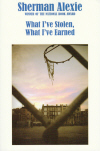What I’ve Stolen, What I’ve Earned
“14. Am I defined by what I’ve seen, or do I define the world by what I’ve witnessed? O, what beautiful or terrible thing waits around the next corner? Who isn’t in love with this mystery?” This final line in “Sonnet, With Some Things That I Have Seen” states the central questions burning in the heart of Sherman Alexie’s book of poems, What I’ve Stolen, What I’ve Earned. Alexie, in a uniquely experimental way, delivers a punch with his deceptively lighthearted, yet exquisitely pointed, commentary on topics as complex as life on the reservation, family, gay marriage, death and loss, terrorism, racism and much more. With his fresh twists on traditions and invigorating perceptions, perhaps readers of Alexie’s work will resoundingly answer that the poet was born by his ability to define the world he witnesses.
“14. Am I defined by what I’ve seen, or do I define the world by what I’ve witnessed? O, what beautiful or terrible thing waits around the next corner? Who isn’t in love with this mystery?” This final line in “Sonnet, With Some Things That I Have Seen” states the central questions burning in the heart of Sherman Alexie’s book of poems, What I’ve Stolen, What I’ve Earned. Alexie, in a uniquely experimental way, delivers a punch with his deceptively lighthearted, yet exquisitely pointed, commentary on topics as complex as life on the reservation, family, gay marriage, death and loss, terrorism, racism and much more. With his fresh twists on traditions and invigorating perceptions, perhaps readers of Alexie’s work will resoundingly answer that the poet was born by his ability to define the world he witnesses.
One of the many fresh twists on tradition comes in Alexie’s play on form. His book contains a series of sonnets; most are crafted in block paragraph form, and the only resemblance to a sonnet is the numbering of fourteen potential line breaks. Form, however, is not the only tradition subjected to Alexie’s innovative instincts. In “The Shaman of Ice Cream,” Alexie begins with a quote from Wallace Stevens’s “Sunday Morning” and then twists Wallace Stevens’s “The Emperor of Ice-Cream” in an unbelievably powerful way with this concluding stanza:
In his coffin, our father is cold to the touch.
He’s dead, dead, dead. There is nothing to touch.
His skin is no longer skin.
His eyes are no longer eyes.
His bones are no longer bones.
He is a fossilized hive.
If I picked him up, I could shake him
like a gourd rattle.
Let this goodbye be a death scream.
The only shaman is the shaman of ice cream.
The prevalence of musical references within this collection adds an extra element of gaiety, particularly in his “Odes to Now” section. “Phone Calls from Ex-Lovers” contains a dose of delightful commentary on free verse poetry and its limitations, which is, “Free verse isn’t designed to be / Memorized.” Alexie “interrupts” his poem to list “The Top 100 Songs of 1984” with the belief that readers will remember the lyrics to almost ninety percent of the songs listed because “(m)emory requires rhythm and rhyme.” Alexie also writes a couple Odes to [insert song title]. These odes contain examples of Alexie’s ability to craft beautiful tempo, sound and subtle rhyme. Take Alexie’s opening stanza in his “Ode to ‘My Sharona’”:
It opens with that insistent drumbeat—
And then that filthy bass riff—
And then he pleads—
He sings—he preaches—he lifts—
He st-st-st-st-st-stammers his need
For Sharona. He doesn’t hedge or hide—
He interrogates—he declares—
He sweats and swears—
He loves her kind—he wants her eyes and thighs—
Due to Alexie’s heritage and references to powwows, drums make a frequent appearance in his poetry. As a child, I attended powwows and owned a few cassette tapes of drum circle groups, like Smokeytown Singers. I couldn’t separate these experiences when reading Alexie’s poems, nor would I want to. It deepened my experience to feel in my bones what Alexie was saying when he wrote, “During powwow, even God wants to sing and dance, / So God makes thunder, lightning, and rain with drums. // Nobody has gone to bed yet. We’ve been awake for days. // Sometimes I think that every Indian is made of drums.”
Alexie’s poems cut through the masks, the war paint, the dance regalia, or whatever other disguise people like to hide behind. The naked honesty in his poetry helps us to “find the strength / To remove our clothes / And give away the width, depth, and breadth / of our fragile bodies and finite souls.” Perhaps Alexie’s poems will inspire all his readers to try to define the world we have witnessed, rather than letting ourselves be defined by what we have seen; to infuse fresh, innovations to our traditions and upbringing; and to love and question this mystery called life experience.





